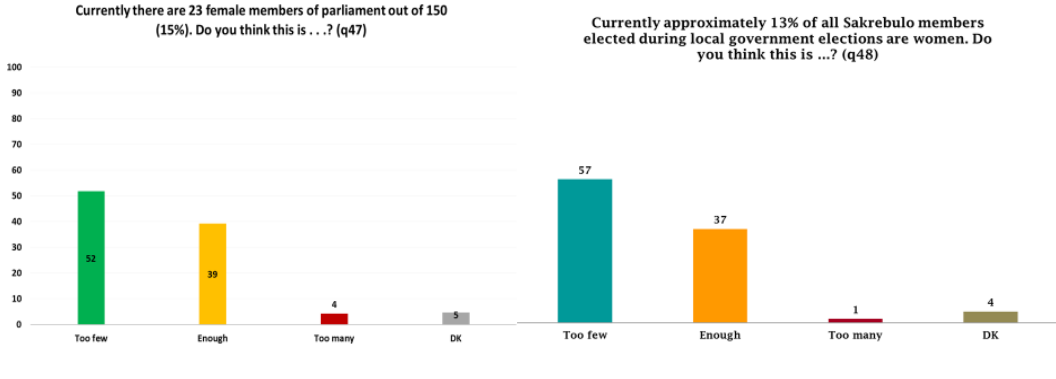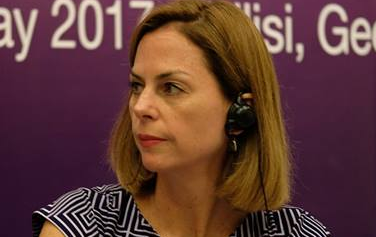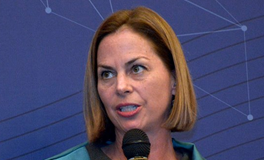interview
 10.04.2019 (Caucasian Journal) As Caucasian Journal continues to cover the current stage of civil society development in the Caucasus, we have prepared this kind of questions for our today’s guest Laura THORNTON, Global Associate/Senior Director at National Democratic Institute (NDI) in Georgia. (Read the Georgian translation here).
10.04.2019 (Caucasian Journal) As Caucasian Journal continues to cover the current stage of civil society development in the Caucasus, we have prepared this kind of questions for our today’s guest Laura THORNTON, Global Associate/Senior Director at National Democratic Institute (NDI) in Georgia. (Read the Georgian translation here).Laura THORNTON: Absolute pleasure to be here. Well, I certainly do like flowers, and I am not one to say that there is anything fundamentally wrong with getting the public to focus one day a year on the often rather dire situation many of the world’s women find themselves, or to celebrate mothers. Do I wish that we could have this conversation and focus 365 days a year? Absolutely.
AK: Your organization – National Democratic Institute – is globally renowned for a very wide range of activities, while in Georgia NDI pays particular attention to the analysis of public opinion trends. That’s why, when your representatives talk publicly, it’s not just words. In most cases, your comments are based on a serious research data, so you know exactly what you are talking about. NDI recently released a detailed report on gender equality and women’s political participation (full text here). Can we say that you and your team are currently the most knowledgeable people on the issues of gender equality in Georgia?
LT: I would certainly not take credit for that esteemed position. There are many knowledgeable people in Georgia on this issue, and who have been working on women’s political empowerment for years. But you are correct in that NDI believes that expertise and advocacy is better served by empirical data. We have a strong commitment to working with our partners in government, parliament, political parties, and civil society to understand and utilize research in the work they do. For over five years now, we’ve actually had an intensive research training program (formerly with Swedish support and now with support from the United Kingdom) for these partners to help them better identify quality research, handle data, interpret and analyze findings, and translate research into concrete messages, platforms, and communications strategies. For example, the Gender Task Force, on which NDI plays a central organizing role, utilized NDI public opinion polling and focus groups in their campaign to advocate for gender quotas, and the subsequent committee hearings heavily utilized this data. The Gender Equality Council in the parliament has also relied on our research to better inform their legislation and policy initiatives. Beyond gender, NDI research has helped partners develop more robust and citizen-focused legislation at the national and local levels.
Our data isn’t just for a small subset of partners. Rather, NDI’s research, which is conducted with the talented CRRC-Georgia, is fully transparent, and, thanks to CRRC, is available for anyone to analyze through an online data platform (https://caucasusbarometer.org/en/datasets/), where people can do their own cross-tabulations, create charts and tables, and even download entire datasets. Literally millions of charts have been made from our data. NDI also produces papers and analyses of our research, develops infographics and data charts, and has its own podcast to more deeply explore our research findings with various stakeholders. This has allowed for a much broader penetration of our work, so we are the most used and cited research on Georgia not only in Georgia, but by the U.S. and European embassies and governments, NATO, EU, think tanks, and international journals and media outlets.
AK: Our readers will not forgive me if I do not move now directly to your report’s findings. Was there anything surprising - or perhaps even shocking - in this particular report’s results? If yes, can you share 1-3 most alarming or otherwise important facts or figures?
LT: The report draws upon more than a decade of polling questions on gender issues, including our efforts starting in 2014 to dedicate entire polls and focus groups exclusively to these issues. We have explored a wide range of topics from maternity leave, sexual harassment, women in the military, women’s political participation, career stereotypes, to women engaged in agriculture, women’s labor rights, and girls’ education.
Some important findings include the fact that Georgians – both men and women – report wanting to see far more women in elected office. In fact, 85 percent of Georgians believe that parliament should include at least 30 percent women. I do realize that in face-to-face polling, which we do in Georgia, political correctness can possibly skew responses, but nevertheless no matter how we ask this question it is clear that majorities would like to see a more inclusive governance.
Another important research finding was from our focus groups on sexual harassment. We used an innovative technique so that instead of asking direct questions, we told a story of two work colleagues, Teona and Nodar. At intervals throughout the story we asked focus group participants how they felt, and they then wrote their observations and feelings individually in a comics format at the end of the story. Basically, it was an evolving story of sexual harassment, which escalated to the point of Nodar trying to get into Teona’s hotel room on a business trip. While the participants mostly all disapproved of Nodar’s behavior, the majority did not suggest that Teona report the case to her boss. For those who did envision Teona telling her boss, they described the incident in moderate terms, something unpleasant, but not labeled as sexual harassment per se. At the end of the day, participants felt Teona would have to leave her job or be fired, acknowledging that there could be no justice for her. While these findings were disturbing, they did offer important insight to NDI and our partners in parliament in drafting legislation to attempt to provide such justice to women like Teona.
Finally, our research has identified specific struggles facing women in the country, with 81 percent of Georgians citing domestic violence as the top problem, followed by early marriages (72 percent), and sexual harassment (56%).
AK: Perhaps there are issues of which NDI has warned in the past, and now they are re-conformed by new research data?
LT: I would not say NDI specifically but certainly many women’s and human rights organizations in Georgia for some time have explained that in Georgia, as in most places, there are deep-rooted societal stereotypes that need to be addressed. We certainly have had our poll data confirm this. There are specific beliefs, for example, about “suitable” work for men and women. There are also imbalanced expectations about marriage and infidelity. There are assumptions about women’s roles in the household and childcare.
AK: Georgia lies between Europe and Asia. What about the traditional attitudes to the role of women, and perception of sexual harassment – is the situation closer to the levels in Europe, or in Asia?
LT: Interestingly, our polls show Georgians have quite a broad definition of sexual harassment, with over 80 percent defining demands for sexual favors, creating an uncomfortable working environment, making unwanted advances, and touching a stranger all as forms of harassment. An overwhelming majority (77 percent) of citizens support legislation against sexual harassment, which is very positive. At the same time, awareness differs from rural to urban settlements, and the concept of sexual harassment is less recognized in ethnic minority settlements, although even there people are in favor of legislation.
I think it is difficult to make comparisons across regions. I spent 20 years working in Asia, and each country within this region was so different in this regard from one another. Suffice it to say, Europe, Asia, Georgia, the U.S. – we all have more to do to address these obstacles.
AK: Women at work in Georgia. I am sure there are inequalities in salary, but are they much different form the levels in developed countries?
LT: Pay gaps are common in many countries, you are correct. So we are all, in a sense, in this together and can learn from and support one another. There are specific legislative proposals, for example, in the U.S. that would attempt to correct this through greater transparency of pay scales and other measures. The Gender Equality Council here is exploring how Georgian legislation could address this as well.
AK: Women and the politics in Georgia. After the last presidential election, the criticizers have lost one strong argument, or didn’t they?
LT: I’m not sure they did. I think it is important to see women and minorities in high elected positions in countries. I do not agree with the belief, however, that if that occurs, it means a history of inequality is wiped out. President Obama was our first black president. We still certainly have a long way to go to tackle deeply ingrained and harmful racism in our country.
As for Georgia, it is still far behind with regard to equal political representation. Currently, women hold only 15 percent of seats in parliament. The situation is even worse at the local level, where women hold no governorships (out of nine), one mayoral post (out of 64), and only 13 percent of seats in sakrebulos [local city councils] (of 2,038). In some municipalities, such as Marneuli, not a single woman holds a seat on the local council. As a result, more than half of the Georgian population has a minimal say in the political process affecting their daily lives. Legislation is written by male representatives, based on their analysis of the needs and priorities of the population.
Women who are interested in politics also must face the political parties, who are the gatekeepers of political participation. Where parties lack transparent, fair, inclusive, and competitive selection processes, women are less likely to be nominated as candidates. Parties should consider providing clear criteria for candidates, using an open and broad recruitment process, and a competitive and transparent selection process in order to guarantee equal access to a broad spectrum of society, which would lead to more women and better qualified candidates overall. Party leaders – here and most everywhere – are too quick to blame women for “not joining them,” rather than being more self-reflective as to how to make their parties a place women would want to join.
Women politicians and well-known figures, as well as gay men, are also the victims of such practices as the distribution of videos depicting their personal lives. To me, this is a form of political terrorism, and a deterrent to some women who might be interested in becoming involved in politics.
AK: I believe NDI’s polls confirm that Georgian population generally affirms the movement towards NATO membership. But is it prepared to see women serving in the army?
LT: It is an interesting question. Our research has shown that the military continues to be viewed as a career path for men. NDI’s February 2018 focus groups found that participants did not view the military as a “female profession,” characterized it as unfeminine and suggested women were not physically capable. They also described the military as a job taken out of desperation rather than by choice. Focus group participants expressed that they would prefer that their female family members not serve in the military, but these attitudes may be changing. According to NDI’s June 2018 public opinion poll, 49 percent of respondents said they would support their daughter’s decision to serve in the military, which is an eight point increase from NDI’s April 2017 poll. (When asked whether they would support their son’s decision to serve in the military, 89 and 86 percent of respondents said they would support this decision in April 2017 and June 2018, respectively.) Further, our focus group participants believed women should have the freedom to pursue a military career, even if they themselves disapproved of this path.
AK: Research findings are always interesting to discuss, but even more important are NDI’s policy recommendations. What steps should the authorities and the society undertake, in your view?
LT: NDI is not particularly prescriptive in its approach. Rather, we work with our partners in parliament, parties, government, and civil society to develop solutions and policy prescriptions that are relevant and appropriate in the Georgian context. We have offered broad-based general thoughts and recommendations based on our research on gender. For example, we have pointed out the need to clearer and more vocal about the advantages of more representative politics - why it benefits society to have legislative bodies that look like the country’s people. Experience has proven that the larger the base of people involved in decision-making, the greater the pool of talent and options, and the more innovative the solutions and policies developed.
I’ve also for a long time talked about the importance of reaching people at a much younger age. I think we need to start thinking more about girls and their leadership opportunities. I know for me, participation in team sports, Girl Scouts, and debate club gave me valuable confidence and competitive spirit. I understand that there are few opportunities for girls in Georgia in this regard… I think we need to take a “whole of society” view on women’s participation, which will involve the more difficult, holistic, and long-term approach, engaging with educational institutions and communities, rather than focusing on just policies and institutions.
AK: NDI’s polls and other research often touch issues, which are quite sensitive. In which cases do you feel that the society is not completely prepared to discuss them freely? Have you experienced that certain questions are answered less frankly, or the mass medias are hesitant to cover any specific subjects?
LT: There are of course sensitive topics in all countries. But NDI does not shy away from dialogue on these subjects, as only through such talking and sharing can we get somewhere. I think religion is always one of those areas in which there are powerful feelings, and it is often difficult to ask questions without putting people a little ill at ease. I think there are ways we can get people talking and thinking about the impact of religion in Georgia, particularly on the subject of gender, without being offensive or intolerant. We have certainly asked about some of these issues in our research.
NDI believes strongly in the equality of all people, including the LGBTQ community. We have worked directly with LGBTQ organizations and have held events bringing these groups together with policymakers to start a dialogue. We understand that there are sensitivities around this in Georgia, but believe that having more discussions and awareness-raising might help ensure and protect the dignity and rights of minorities, and we are committed to that. I have seen how quickly attitudes can change - in the U.S. in 1988, only 11 percent of Americans approved of gay marriage, for example, while today almost 70 percent do. I know Georgians to be loving, tolerant people, so I am hopeful we will see an end to the practices of discrimination and abuse against this community that we see today.
AK: Thank you very much. You are welcome to share NDI’s findings with the readers of Caucasian Journal anytime.
LT: Thank you so much for giving me this opportunity, and we wish this new Caucasian Journal the greatest success!
Read the Georgian translation here
This article was re-published by:
- ICC Georgia republished Caucasian Journal's interview with Laura Thornton of NDI Georgia in its newsletter. Laura Thornton's interview is on pages 8-13.






No comments:
Post a Comment